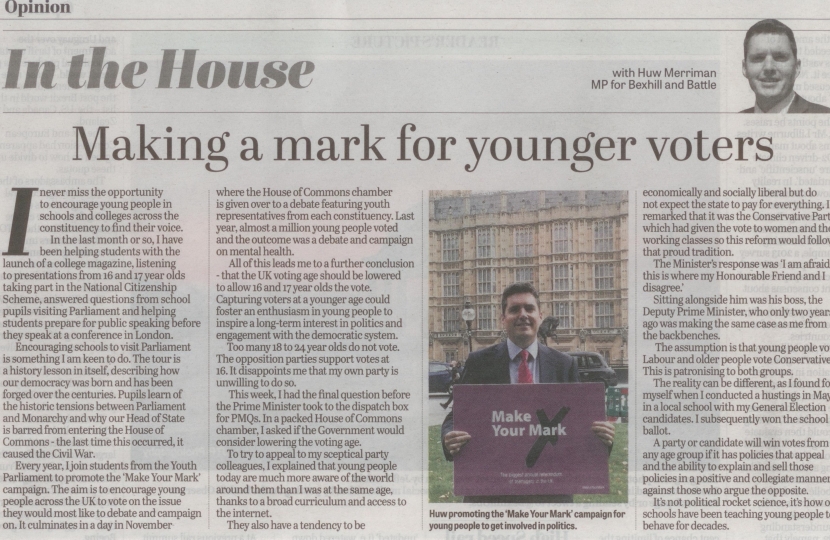
I never miss the opportunity to encourage young people in schools and colleges across the constituency to find their voice. In the last month or so, I have been helping students with the launch of a college magazine, listening to presentations from 16 and 17 year olds taking part in the National Citizenship Scheme, answered questions from school pupils visiting Parliament and helping students prepare for public speaking before they speak at a conference in London.
Encouraging schools to visit Parliament is something I am keen to do. The tour is a history lesson in itself, describing how our democracy was born and has been forged over the centuries. Pupils learn of the historic tensions between Parliament and Monarchy and why our Head of State is barred from entering the House of Commons - the last time this occurred, it caused the Civil War.
Every year, I join students from the Youth Parliament to promote the 'Make Your Mark' campaign. The aim is to encourage young people across the UK to vote on the issue they would most like to debate and campaign on. It culminates in a day in November where the House of Commons chamber is given over to a debate featuring youth representatives from each constituency. Last year, almost a million young people voted and the outcome was a debate and campaign on mental health.
All of this leads me to a further conclusion - that the UK voting age should be lowered to allow 16 and 17 year olds the vote. Capturing voters at a younger age could foster an enthusiasm in young people to inspire a long-term interest in politics and engagement with the democratic system. Too many 18 to 24 year olds do not vote. The opposition parties support votes at 16. It disappoints me that my own party is unwilling to do so.
This week, I had the final question before the Prime Minister took to the dispatch box for PMQs. In a packed House of Commons chamber, I asked if the Government would consider lowering the voting age. To try to appeal to my sceptical party colleagues, I explained that young people today are much more aware of the world around them than I was at the same age, thanks to a broad curriculum and access to the internet. They also have a tendency to be economically and socially liberal but do not expect the state to pay for everything. I remarked that it was the Conservative Party which had given the vote to women and the working classes so this reform would follow that proud tradition. The Minister’s response was 'I am afraid this is where my Honourable Friend and I disagree.' Sitting alongside him was his boss, the Deputy Prime Minister, who only two years ago was making the same case as me from the backbenches.
The assumption is that young people vote Labour and older people vote Conservative. This is patronising to both groups. The reality can be different, as I found for myself when I conducted a hustings in May in a local school with my General Election candidates. I subsequently won the school ballot. A party or candidate will win votes from any age group if it has policies that appeal and the ability to explain and sell those policies in a positive and collegiate manner against those who argue the opposite. It's not political rocket science, it’s how our schools have been teaching young people to behave for decades.


